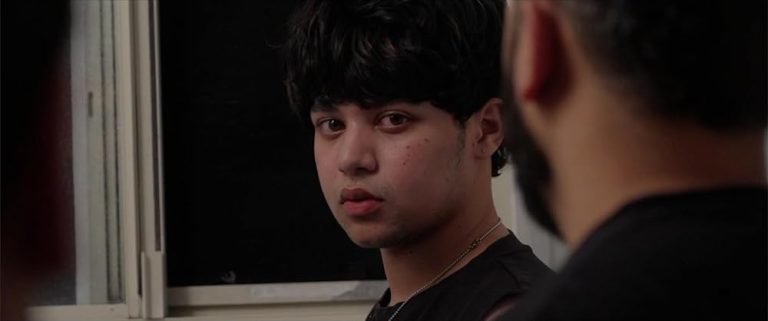Misha Vallejo Prut’s “Light Memories” circles an act of searching. Misha never got to know of his grandfather. Many reserves exist between his family and his grandfather. An unraveling occurs at the center of the film. A mystery comes to the fore, excavating which becomes Misha’s driving pursuit. It inches deep and morphs into his obsession. It’s like a roadmap for him, by which he unearths family secrets. Stories that have been repressed, of family ties that got pushed into taboo-there are many anecdotes and histories put under the lid for years. This silence is what Misha attempts to rip through.
Who was his grandfather? Why doesn’t anyone talk about him? His name is evaded in discussions. It’s a no-go zone for the family. Misha’s quest is propelled by curiosity and empathy. The past acts as a conduit for understanding, and making sense of the present. Why is there such a thick veil of secrecy on his grandfather?
Misha inherited his photography. But he is also inquisitive about the flaws and the rougher edges binding. Photographs are vessels of a time, a moment locked with all its suggestive glimpses, everything that lies unsaid. He riffles through the various slides his uncle found that belonged to the man whose existence is wrapped in mystery. They are mirrors of a fractured time, a social history of internal rifts. Through them, Misha becomes cognizant of his past, both private and larger coalescing inseparably.
Repressed family history perforates the film. His grandfather didn’t acknowledge this part of the family, pushing them into illegitimacy. Chasms of social class rupture the impulse to forge a bond. There are so many narratives, both hidden and unconcealed, in one’s past and native ties. Their connections to the present become strikingly clear with the ingress of earnest investigations. Misha yearns to burrow into the base of his family. A richness of insight and intuition speckle the search. But there’s also the increasing forgetfulness of the grandmother.
Misha is foraging through the terrain of memories that aren’t necessarily pleasant and warm. They are difficult, prickly, and unforgiving. Navigating them requires sensitivity and candor. Misha doesn’t vaunt any extravagant aesthetic flourishes. The documentary is direct, searching, and attentive, laced with kindness. How did the paternal absence affect the family? Abandoned by her husband, his grandmother fended for a family of four alone. Survival was ruthless. Somehow they scraped through.
The film traverses an emotionally rich terrain in a distinctly unsentimental key. There are no maudlin stretches, despite a reckoning with pain and anguish in family history. It’s an angle of steady curiosity buttressed by genuine exploratory urge. Misha wanders through the hints and implications shot off by the photographs.

The family is still haunted by the absence and denial though it has tried to put it aside and not attribute it too much credence. As he goes about dredging up the scars, fault lines reveal themselves with inevitable force and tragedy. One wonders how deep the pain runs. What does it take to get to the root of the tussle in admitting the intense anguish one has staved aside? Healing needs an admission first. By eluding the history, the family assumes it’ll bury all its accumulated grief and ordeal of enduring. The film journeys to rendering these admissions publicly legible. They become part of parlance and gain new registers of meaning.
“Light Memories” admirably doesn’t push its incisive searching. It’s girdled by a softness of being, a compassionate consideration of the trauma and hurt that’s rekindled in the process of digging. The handling is gentle and delicate, mindful of the toughness of the unraveling. We are taken through the inquiries gingerly but not too warily. There’s an element of openness and transparency a pursuit like this warrants. “Light Memories” understands soul-searching intimately and powerfully.
“A Want in Her” traverses complicated family history. There’s resentment and grief in a devastating mix. The filmmaker Myrid Carten grapples with the all-encompassing, overwhelming emotions her mother Nuala lashes out. The intensity of her love and bitterness was overwhelming. Nuala has a history of mental lapses. She is an absconding presence, emotionally unavailable. Carten seeks a grip on the emotional instability and violence that her mother’s existence demands. Nuala was sectioned twice or more.
Carten’s anguish permeates the film. “She doesn’t want to be saved”, she insists about her mother. Love can’t be the remedy. The flailing helplessness of being unable to rescue her mother has curdled. How long can she care for her mother, someone who actively resists any help offered? Accompanying this is the inevitable stab of guilt in forgoing the responsibility of nurturing. But this caregiving relationship is tinged with toxicity for it eats into the well-being of the daughter who has tried to be as earnest and committed a support system. There has only been rebuff.
“A Want In Her” mines the myriad emotional layers in the relationship. It’s complex, tricky and unsettling. Carten avoids sentimentalizing or maintaining a persistently dour tone in the film. It’s seething, searching, and intensely self-reflexive. As the film wanders through her own collections and calls to her mother, it crystallizes with pained honesty, vulnerability, and self-interrogation.



![Those Who Work [2018]: ‘Locarno’ Review](https://79468c92.delivery.rocketcdn.me/wp-content/uploads/2018/08/Those_who_work_hof_review_1.jpg)



![Cinemawala [2016] : A heartbreaking ode to the single screen theaters!](https://79468c92.delivery.rocketcdn.me/wp-content/uploads/2016/08/Cinemawala555-768x392.jpg)